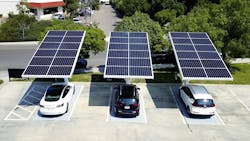Beam Global Receives $1M Order from UK Ministry of Defense for 10 EV ARC Charging Systems for Military Bases
Beam Global, a provider of sustainable infrastructure solutions for the electrification of transportation and energy security, has received a $1 million order from the UK Ministry of Defense (MoD) for 10 EV ARC sustainable EV charging systems and one ARC Mobility trailer.
The Beam EV ARC system is a solar-powered, off-grid charging solution that can be rapidly deployed without construction, electrical work, or utility connection.
Each EV ARC system generates and stores its own clean electricity and delivers that electricity to up to six Level 2 EV chargers simultaneously. The system fits in a standard parking space, is transportable, and includes an Emergency Power Panel to provide vital electricity for military equipment and personnel.
The EV ARC has been found to be well-suited for military and commercial deployments, and hundreds of systems have been deployed across the US for the US Army, US Marine Corps, US Department of Homeland Security, and several other US federal agencies.
The purchase order for the systems was placed through CCS, the main purchasing vehicle for UK government entities.
The EV ARC systems and ARC mobility trailer will be deployed at British Sovereign Bases on Cyrpus through Project EVOLVE – Rapidly Deployable and Transportable Electric Vehicle Charging Solution.
“Beam Global’s patented solar-powered EV ARC will provide not only clean energy for British military electric vehicles in Cyprus, but the product is multi-utility and will be trialed to provide green energy and power key defense equipment in remote locations and overseas areas,” said Brigadier Tom Harper – the British Strategic Command attaché to the US.
This purchase order also aligns with the UK’s commitment to transition all government-owned cars and vans to zero-emission alternatives by 2027.
About the Author
Breanna Sandridge, Senior Editor
Breanna Sandridge is senior editor for EnergyTech and Microgrid Knowledge, both part of the energy group at Endeavor Business Media.
Prior to that, Breanna was managing editor for Machinery Lubrication and Reliable Plant magazines, both part of Noria Corp. She has two years experience covering the industrial sector.
She also is a 2021 graduate of Northeastern State University (Oklahoma) with a Bachelor's in English.
